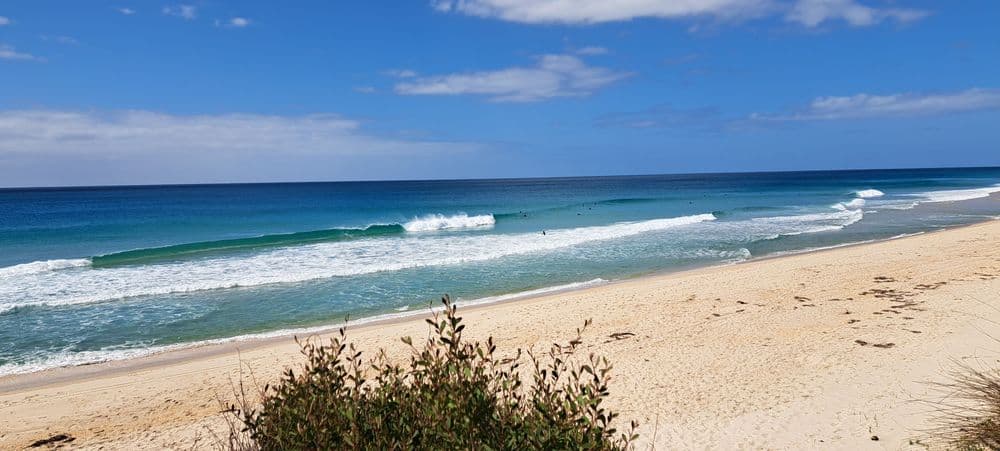Dr Andy Irwin: "I love the individual quirks and characters in small town medicine."

In Australia, the demand for doctors in rural and remote areas remains high, offering unique opportunities for locum work.
Locums can immerse themselves in the natural beauty and laid-back lifestyle of coastal and inland communities. This blend of professional fulfilment and personal leisure makes locuming in rural and remote areas particularly appealing, allowing medical professionals to make significant community impacts while enjoying the scenic, recreational benefits these regions have to offer.
We caught up with Dr Andy Irwin, who locums in General Practice/Emergency Medicine primarily in rural and remote areas of Australia, to have an insightful chat about locuming in these regions.
The location of the secret wave in the header image was not disclosed by the locum, but he assures us it was the best surf of his life!
Can you tell us about your background and what led you to become a Rural Generalist?
Well, I'm not a true Rural Generalist in the true "Queenslander" definition of the role, but I do a lot of rural/remote emergency work with a smattering of office-based GP thrown in now and again. If I HAVE to, I much prefer ED.
I got into this for a combination of reasons:
- Probably primarily, there is more adventure to be had in the far-flung corners of the world than in more "civilised" centres. I love the individual quirks and characters in small-town medicine. The fishing is better, and the everchanging setting of my 'workplace' leads to neat exploration and experiences.
- I love the "make it work" or "McGuiver" mentality of low-resource settings, as well as the greater reliance on clinical medicine and gestalt when the nearest CT is 480 km away and bloods takes a 36-hour turnaround time.
- The GP qualification is more recognised in Canada (my home country) than the FACEM qualification, so it will be easier to work in a similar "rural/remote ED locum" capacity partially there, and partially here in Australia.
How did you first hear about locum work, and what motivated you to pursue it?
A person just KNOWS about locum work; in the same way a person KNOWS about taxes, I didn't really HEAR about it rather than have I suppose always been aware.
- I pursued it because I hated being locked down for vacation times, leave, etc. Sometimes, I wanted to go home for four months at a time, and with locuming I didn't have to ask permission, I just didn't book any contracts for that period!
- I also hated nights, so I just DON'T accept roles that involve night shifts.
- I also am available in a more flexible sense for better financial incentives. When a place is desperate for last-minute cover I often am able to get a much better rate than if I plan ahead.
- Overall, I worked out that for a similar income as a"regular" employed doctor, I have to work about 1/2 as many days, so I have more time at home with my new son, doing fun things in my neighbourhood!
Has locum work and rural work influenced your medical career and professional growth? How?
Of course. I'm more confident now than when freshly fellowed, and more comfortable dealing with the "oh shit" moments in the country.
I'm also a stronger advocate for my patients than I was previously. I think we all grow and develop as we trundle along in our careers, and locuming/remote medicine is no different.
Certainly, professional growth in being THE leader of active resus scenarios, working with variably capable nursing staff that you don't KNOW if they're competent or just SEEM competent, is something that I've become more comfortable with over my (relatively short 18 months) time in rural and remote EDs.
Looking for a doctor job that matches your career and lifestyle aspirations?
Search jobsIt's become natural to keep track of closed loop communication and keep discussion open/create an environment for others to offer thoughts/opinions to share out the cognitive burden of running a resus: a part of the job that I certainly dreaded at the start.
Do you have any memorable experiences from any of your rural locum assignments?
Oh, you see some interesting and funny cases now and again.
I remember a few times with resus cases in small hospitals saying, "This is the only patient in the hospital right now, everything else is on hold until we get control here."
Some very entertaining cases that could only really occur in the country, but I'm not sure I can do them justice without breaking confidentiality. Farmers are sure quite an innovative bunch - both in how they overcome problems on the farm - and correspondingly in how they injure themselves! In general, I've found them more than willing to have a chuckle with you at their expense!
What have been some of the biggest challenges you've faced while working as a rural locum, and how did you overcome them?
Surprisingly, the biggest challenges have largely been bureaucratic, governmental, and policy-based. The previously mentioned "MacGyverism" of rural, low-resource medicine is not ... 'bureaucratically compartmentable,' which often causes headaches. At times, protocols force certain decisions that may not necessarily be the "best option" for the patient/health system/practitioner/receiving team in the current situation.
What skills or qualities are essential for a successful Rural Generalist locum doctor?
Positivity. It would be very easy to become pessimistic/frustrated/grumpy and disagreeable when faced with the 'quirks' of rural medicine.
I remember spending a solid amount of time arranging an urgent retrieval for a 'first worst' thunderclap headache before I left the hospital for the evening, only to see the patient outside having a ciggy when I came back in the morning. The decision there: does one get on the phone and yell at the transport team, or does one shrug, laugh, and decide they passed a trial of life?
Being grumpy and prickly makes you difficult to approach by any support staff (clinical or admin) who don't know you, leading to missed communication and occasionally to suboptimal outcomes and more frustration!
The best rural ED/GPs I've worked with have - as a rule - been the most amiable, friendly, quick-to-laugh doctors.
Are there any specific regions or types of locum work that you would recommend based on your experience?
I would recommend that anyone looking into working in rural/remote locations avoid towns on the ocean with good fishing and surfing, as I intend to fill these roles. I hear Kargoolie is great at that time of year. YOU should totally go check that out. I'm already busy that day!
Looking back, what is your biggest highlight of working as a locum doctor?
I got to this one town that I'd been hoping to check out for AGES, as it has a reputation of being Australia's best, "worst-kept secret" surf spot. After finishing my shift that day, I got these GLORIOUS left-handers. The team in the hospital kitchen always sneaks me a hot lunch, and the work is pretty good, too.
Has working in rural areas changed your perspective on healthcare delivery? If so, how?
In many ways, the challenges related to the "tyranny of distance" equate to an almost "accidental" sieve for patients. By this I mean that the sick patients or the "I can't differentiate this complaint based on the diagnostic equipment available here" will often get sorted more thoroughly when retrieved to a major centre. Sure, the patients grumble about the need to travel for an echocardiogram or an elective hip replacement, but the system actually works quite well for emergent or potentially emergent issues. Honestly, that's how I'd prefer to have it!
What advice would you give other doctors considering rural locum work?
They make fishing rods that break into three pieces and will, therefore, fit into a standard suitcase. This is a good investment. Good squid jigs are worth the extra few dollars. Also, do an ultrasound/eFAST course, as most places have at least some kind of ultrasound machine kicking around the hospital.
